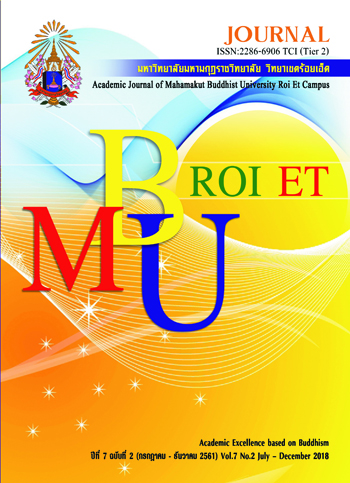Management of Vocation Education by Informal and Non-formal Education Centre in Mung District of Roi Et Province
Main Article Content
Abstract
The purposes of this thematic paper were aimed to : 1) To study the Management of Vocational Education Management of non-formal Education and informal education centers in Mueang District, Roi –Et Province, 2) To compare the management of occupational education of Non-Formal and Informal Education Centers in Mueang District, Roi –Et Province There are different types of vocational trainers with different sexes, ages and education levels. And 3) to Study the Suggestions of Vocational trainers on the management of occupational education of the Non-Formal and Informal Education Center, Mueang District, Roi –Et Province. The Sampling groups were 126 vocational trainers. Define the Sample using the Taro Yamane formula. The research instrument was a five-level scale. Have confidence the reliability was 0.94. The Statistics used for data analysis are Frequency, Percentage, Mean, Standard Deviation and t-test. One-way ANOVA F-t-test
The results of the study were as follows: 1) The Management of Vocational Education Management of non-formal Education and informal education centers in Mueang District, Roi –Et Province was at a high level. In each case, And in two medium level. From the top to the lowest, the curriculum management. Director The process of learning. And the budget. 2) The results of the hypothesis test showed that the occupational trainees had different sex, age and education level. There were no significant differences in the opinions of the administrators in the management of the non-formal education and non-formal education of the Municipality of Roi-Et. And 3) Vocational trainers gave suggestions on the Management of Vocational Education Management of informal and informal education centers in Mueang Disitict, Roi–Et Province. High priority should be placed in the top three, ie, adequate and timely budgeting should be provided. And when the training is completed, the market should be supported.
Article Details
References
การศึกษานอกโรงเรียน, กรม. (2543). แนวทางการจัดกิจกรรมการเรียนรู้การศึกษานอกระบบ . “ผู้เรียนสำคัญที่สุด”. กรุงเทพฯ : กองพัฒนาการศึกษานอกโรงเรียน.
ธีระศักดิ์ อุ่นอารมณ์เลิศ. (2549). เครื่องมือวิจัยทางการศึกษา : การสร้างและการพัฒนา. นครปฐม : ภาควิชาพื้นฐานทางการศึกษา คณะศึกษาศาสตร์ มหาวิทยาลัยศิลปากร.
เนตรนภา ประเสริฐสังข์. (2558). การจัดการเรียนการสอนหลักสูตรอาชีพ สังกัดศูนย์การศึกษานอกระบบและการศึกษาตามอัธยาศัย อำเภอเมืองพะเยา จังหวัดพะเยา. วิทยานิพนธ์ศิลปศาสตรมหาบัณฑิต. บัณฑิตวิทยาลัย : มหาวิทยาลัยพะเยา.
บุญชม ศรีสะอาด. (2545). การวิจัยเบื้องต้น. พิมพ์ครั้งที่ 7. กรุงเทพฯ : สุวีริยาสาส์น.
ภิญญาพัชญ์ ภาคย์พิริยะกุล. (2554). ความคิดเห็นต่อการบริหารจัดการศึกษาอาชีพศูนย์การศึกษานอกระบบและการศึกษาตามอัธยาศัย อำเภอเมืองนนทบุรี จังหวัดนนทบุรี. วิทยานิพนธ์ศึกษาศาสตรหาบัณฑิต. บัณฑิตวิทยาลัย : มหาวิทยาลัยเกษตรศาสตร์.
รดาณัฐ อินกา. (2558). ความคิดเห็นต่อการจัดการศึกษาในการส่งเสริมอาชีพสังกัดสำนักงานส่งเสริมการศึกษานอกระบบและ การศึกษาตามอัธยาศัยจังหวัดพิษณุโลก. วิทยานิพนธ์ครุศาสตรมหาบัณฑิต. บัณฑิตวิทยาลัย : มหาวิทยาลัยราชภัฏพิบูลสงคราม.
วิรวุฒิ พุ่มสว่าง. (2554). การบริหารจัดการศึกษาอาชีพของศูนย์การศึกษานอกระบบและการศึกษาตามอัธยาศัย อำเภอบางซ้าย จังหวัดพระนครศรีอยุธยา. วิทยานิพนธ์ ครุศาสตรมหาบัณฑิต. บัณฑิตวิทยาลัย : มหาวิทยาลัยราชภัฏสวนสุนันทา.
วีระชัย จีบไธสง. (2559). การบริหารจัดการศึกษาอาชีพ ศูนย์การศึกษานอกระบบและการศึกษาตามอัธยาศัย อำเภอลำทะเมนชัย จังหวัดนครราชสีมา. วิทยานิพนธ์ครุศาสตร มหาบัณฑิต. บัณฑิตวิทยาลัย : มหาวิทยาลัยราชภัฏบุรีรัมย์.
เอมอร ยิ่งเจริญ. (2555). การบริหารจัดการการจัดการศึกษาอาชีพของศูนย์การศึกษานอกระบบและการศึกษาตามอัธยาศัย อำเภอเมือง จังหวัดหนองคาย. ปริญญาศิลปศาสตรมหาบัณฑิต. บัณฑิตวิทยาลัย : มหาวิทยาลัยราชภัฏมหาสารคาม.


